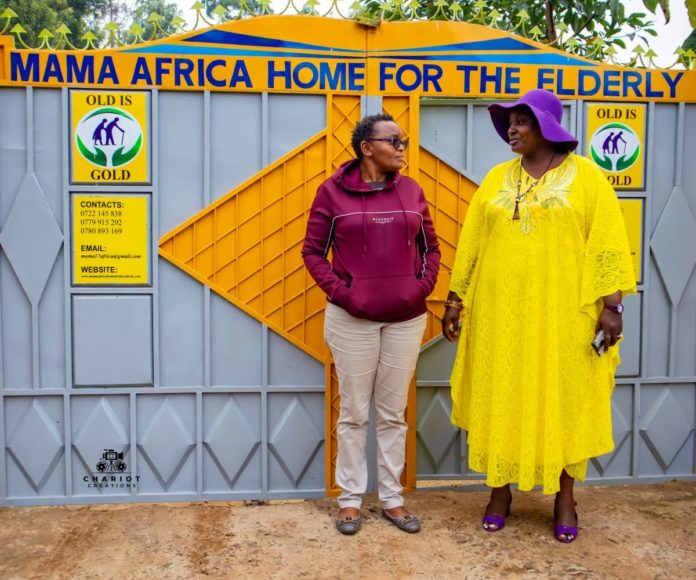|
Getting your Trinity Audio player ready...
|
By Rahab Gakuru
Meru County, Kenya: Traditionally, homes for the elderly in Africa are few and seen as a dishonor to the elderly who are held in high regard in society. It’s also believed that it’s the primary duty of children in caring for their elderly parents.
However, Kenya has been experiencing an intense rural-urban migration by young people who join higher education and eventually settle in the major cities in search of white-collar jobs.
This has left a lot of elderly parents alone in the villages with no one to care for them, raising the concern of abandonment. With that concern, Irene Kirimi fondly referred to as Mama Africa (Mama Africa Swahili meaning mother to Africa) started a home for the elderly in Meru, Kenya.

Mama Africa’s home for the elderly started in 2017, was to solely care for elderly who had no living kin or had been abandoned by their kin.
“There was a great need in my rural community for someone to take on that duty. As we say, charity begins at home, and with the passion I had regarding their welfare, I took on the role to provide them with medical care, food, shelter, clothing as well as psychosocial support to keep them going. So I opened three branches, Meru, Karatina, and Nyeri branches” Irene says.
According to Irene, her earliest problem was that a lot of people in the village didn’t understand why she was starting a home for the elderly.
“Rumors were spreading in the community that I was also collecting old people and locking them away. But after a few visits, they started to understand the need and would visit regularly to keep them company. Constantly having people to talk to and laugh with is therapeutic for them. I would urge children to not neglect their parents for city life. Our parents have done so much to raise us they deserve the best care in their old age” she says.
For homes highly dependent on well-wishers, COVID-19 dried most of those wells of donations.
“Most of my well-wishers lost their income. Business people could only make small contributions as their business had slowed. In 2021, our home, which is rented, had rent arrears for the first time. Although the landlord was patient I had to do something, and fast”.
Adding “I closed the two branches in Karatina and Nakuru. I also gave in to requests for paid care. Children living either abroad or in cities started requesting me to take their parents under my wing at a small fee of Ksh. 10,000 per month. So far I have 7 paying elders that money helps to supplement the donations because I don’t wish to turn this home into a commercial business” Irene says.
Irene also started rearing pigs on her two-acres piece of land that was previously left idle. She pursued this venture after having a conversation with her Bishop, who is a great supporter of her work.
“He implored me to explore farming as a source of income and food for the home. I needed to make this project sustainable, so after some online research on small-scale farming, I settled on rearing pigs and maize farming. We could also use food leftovers from the home to feed the pigs. The pig farming venture is proving to be successful as I now have 46 pigs” she smiles.
Including a nurse and social worker, Mama Africa Home has 11 workers and is currently housing 46 permanent residents. They also have 64 elders on outreach programs.
“The outreach project targets elders who have someone to look after, but can’t afford basic needs. We offer them food, clothing as well as psychosocial support. Our oldest member is 106 years old” she says.
The Government of Kenya has not been left behind in catering for the old, so in 2007 it started the Older Persons Cash Transfer (OPCT) as a pilot in 3 districts, Thika, Nyando and later the program was implemented in Busia, under the Rapid Response Initiative (RRI)-2007.
The program had covered 203,011 households by the 2015/16 financial year. Under the program, poor & vulnerable persons, aged 65-69 years, received Ksh. 2,000 per household per month through appointed payment bank agents.

However, in a bid to expand access to social protection, in 2018 the government implemented the Inua Jamii Senior Citizens’ scheme (Inua Jamii is swahili phrase meaning lifting a community). The scheme offers universal pension coverage for all citizens of Kenya once they reach 70 years of age. Covering approximately 702,000 older persons aged 70 years, each member receives Ksh. 2,000 per month through the bank agents.
The program also offers complimentary membership to the National Hospital Insurance Fund (NHIF), with their contributions paid by the Government, at a rate of Ksh. 500 (US$ 4.8) per month.
Irene has also been running a children’s home in Nairobi, since 2011. The home, Baby Blessing Children’s Home, is a rescue center, a place of hope and home for the homeless.
Currently, it houses between 45 and 55 children who are either orphans, abandoned, neglected, abused, HIV/AIDS positive or those whose only traceable parent or guardian has both a terminal illness and is bedridden.
Irene hopes she will be able to buy a standby ambulance in case of emergencies. “My dream to build a home that accommodates both the children and the elders at my farm is slowly being fulfilled. Although the finances are limited we have started buying and mapping where the structure will be. In the future, I hope to have more homes across Africa to spread the same joy I see here” She concludes cheerfully.














